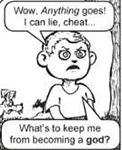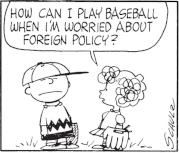|
Outlandish claims are probably definitionally extraordinary, but not all extraordinary claims are outlandish. Outlandish means "strange" or "bizarre", while extraordinary just means "non-standard". A claim so extraordinary as to be ridiculous might be outlandish, but you can have extraordinary claims that are not inherently bizarre. Claiming that I'm a descendant of Scottish nobility would be extraordinary. Claiming that I'm a descendant of Martian nobility would be extraordinary and outlandish.
|
|
|
|

|
| # ? May 27, 2024 12:00 |
|
Djeser posted:Outlandish claims are probably definitionally extraordinary, but not all extraordinary claims are outlandish. Outlandish means "strange" or "bizarre", while extraordinary just means "non-standard". A claim so extraordinary as to be ridiculous might be outlandish, but you can have extraordinary claims that are not inherently bizarre. on more subtle note, outlandish also has a whiff of the victorian, it's slightly old fashioned, extraordinary sounds modern.
|
|
|
|
sebmojo posted:on more subtle note, outlandish also has a whiff of the victorian, it's slightly old fashioned, extraordinary sounds modern. Great, way to be time-ist. I love old fashioned stuff, one day if I ever actually brave real writing, Iíll probably unintentionally use some.
|
|
|
|
Djeser posted:Outlandish claims are probably definitionally extraordinary, but not all extraordinary claims are outlandish. Outlandish means "strange" or "bizarre", while extraordinary just means "non-standard". A claim so extraordinary as to be ridiculous might be outlandish, but you can have extraordinary claims that are not inherently bizarre. Thanks, I didn't think they were but someone told me they were, still didn't sound right in my head.
|
|
|
|
bessantj posted:Are the sentences "He made outlandish claims" and "He made extraordinary claims" interchangeable? Basically no two (different) sentences are interchangeable if you're paying enough attention.
|
|
|
|
Wallet posted:Basically no two (different) sentences are interchangeable if you're paying enough attention.
|
|
|
|
Wallet posted:Basically no two (different) sentences are interchangeable if you're paying enough attention. Good rule to remember.
|
|
|
|
Iíd like some input/critique over an idea Iíve been trying to write for almost a year now. Itís a story about a group of people who get trapped on a derelict ghost ship trapped in ice in the Arctic Ocean. Thereís a supernatural force at work that causes hallucinations and that pulls negative memories and feelings to the surface and drives increasingly violent and ultimately murderous behaviour. It becomes a murder mystery. I have been trying to write the first acts that get the cast to this ship, but the two approaches Iíve fleshed out the most so far keep sending me into endless spirals of obsessive self editing, asking ďbut what if this doesnít make sense?Ē Or ďdoes this characterís motivation and actions seem realistic and understandable?Ē. Idea 1 was to have the cast be tourists on an Artic exploration cruise, the type that gives you a tour of the area around Svalbard and the ship mysteriously gets trapped in ice and itís devices stop working, leaving the cast stranded. The ship is holed and sinks, and the cast are now stuck on the ice, but they spot the derelict in the distance and decide to go towards it for shelter. My issues with this are that it feels quite coincidental and I had planned on one of the cast being aware of and trying to reach the derelict for sinister reasons but I kept trying to think of how to finagle it so they got close, like the guy bribes the captain to go off course. Idea 2 was that the cast are all family members of the crew of the derelict which went missing a couple years before. Since all official search and rescue ops have been called off, the sinister guy from idea 1 decides to fund a private search, but he canít afford it so he needs to get funds from the other family members, reasoning theyíd be willing to put up the cash to keep the search alive. However, some the family members insist on tagging along to participate which is inconvenient but he canít turn them down since they are part funding the expedition. This puts the guy who already kind of knows where it is in charge, removing the coincidence of idea 1 and the need for him bribe the captain. I guess Iím asking if these sound contrived, sensible or if Iím overthinking it? Iíve been trying to avoid the trap of constantly editing as I write but these questions are tormenting me and I finally decided Iíd like some outside perspectives.
|
|
|
|
PiCroft posted:I guess Iím asking if these sound contrived, sensible or if Iím overthinking it? Iíve been trying to avoid the trap of constantly editing as I write but these questions are tormenting me and I finally decided Iíd like some outside perspectives. You're way over thinking it. Ideas are just that - ideas. An idea that sounds dumb can still turn out awesome if the execution is awesome. Have some words of advice from Jim Butcher: Jim Butcher posted:How did you come up with the original idea for CODEX ALERA? Weíve heard rumours that it involved a bet on whether you could combine the Roman empire and PokťmonÖ is that true? Both of the things you've posted sound fine to me. Pick the one that's going to be more fun to write, get your butt in the chair and :justwrite: so you can get it out on the page. Then you can get back to revising and making it awesome.
|
|
|
|
PiCroft posted:I guess I’m asking if these sound contrived, sensible or if I’m overthinking it? I’ve been trying to avoid the trap of constantly editing as I write but these questions are tormenting me and I finally decided I’d like some outside perspectives. What one fits better with you characters? Do you think either one would give you a better situation within which you could explore them to set up the story? As a reader, the specific beats don't matter as much as the overall whole of the story. I have read some great books where a single incident seemed weird, dumb, or out of context, but because it propelled the story forward into something really interesting and good, it faded out of memory very quickly. I think you're really just looking for a macguffin here.
|
|
|
|
PiCroft posted:I guess Iím asking if these sound contrived, sensible or if Iím overthinking it? Iíve been trying to avoid the trap of constantly editing as I write but these questions are tormenting me and I finally decided Iíd like some outside perspectives. Have you tried outlining it? I know some people just aren't into it, but for me the point of iteratively outlining something is that it avoids the problem you're having. By starting with a very high level outline and iteratively increasing the level of detail I can waste the smallest amount of time when I inevitably need/want to make changes. It also helps keep the number of decisions being made manageable because with each iteration I'm (with the occasional exception) locking in the decisions being made so I can build on them and don't have to think about them anymore. I think both of the ideas you posted are perfectly workable, but I wouldn't want to be trying to solving any issues with them while I'm trying to write them.
|
|
|
|
Yeah if you outline the whole thing you can get a sense of the character arcs and where they are going.
|
|
|
|
PiCroft posted:I guess Iím asking if these sound contrived, sensible or if Iím overthinking it? Iíve been trying to avoid the trap of constantly editing as I write but these questions are tormenting me and I finally decided Iíd like some outside perspectives. Yeah, I think an outline or maybe pulling back and really focusing on the characters (since it sounds like the murderous hallucinatory psychodrama is the real focus/what you need to establish things around) might help out since who they are informs how they got there more than anything else. Maybe even start a draft where the group is already on the spooky ship and see what character dynamics feel like they work the best or makes the most sense (or even 2 drafts -- one for each of your starting scenarios). I also think getting to the spooky stuff quickly will probably be 1) more fun to write and 2) more fun to read (unless you're going for a super slow-burn, atmospheric sort of thing, but 'violent supernatural murder mystery' makes me think that maybe cutting to the action faster might be better? Depends on the mood you're going for, of course!).
|
|
|
|
I actually have tried outlining the story, but I often get so twisted up trying to think through every possible plot thread I end up losing my nerve and stopping and just trying to get some words onto the page. That said, I take shoeberto posted:What one fits better with you characters? Do you think either one would give you a better situation within which you could explore them to set up the story? as a good point, I think I'm so obsessed with making things iron clad in terms of logic that I'm losing sight of the more interesting aspects. Thanks for the advice folks, I think I'm going to start trying this technique: Wallet posted:Have you tried outlining it? I know some people just aren't into it, but for me the point of iteratively outlining something is that it avoids the problem you're having. By starting with a very high level outline and iteratively increasing the level of detail I can waste the smallest amount of time when I inevitably need/want to make changes. It also helps keep the number of decisions being made manageable because with each iteration I'm (with the occasional exception) locking in the decisions being made so I can build on them and don't have to think about them anymore. Maybe getting the simplest, broadest strokes down first and moving down layer by layer will help me stop obsessing over the small details so much! edit: Also, I was browsing earlier pages of this thread and I found this talk: https://www.youtube.com/watch?v=_vRfNtvFVRo Which is absolutely pro-click; it was an amazing presentation on how to construct dialog in a way that feels purposeful and punchy. I can't remember who posted it in this thread but thank you to whoever it was 
PiCroft fucked around with this message at 19:26 on Jun 17, 2021 |
|
|
|
PiCroft posted:get some words onto the page.
|
|
|
I'm trying out Scrivener and it seems pretty neat, especially with the option to copy text in BBcode. I encountered a pretty lovely problem with the copy output though, which is best illustrated in the following picture: Anyone knows what's up with this? The problem appears both in scrivener and if I paste the text into a reply here on the forums. I'm guessing it has something to do with my whole Scandi setup, but I've no idea what to do about it. All I know is that issues with corrupted characters can pop up with non-anglicized keyboards and windows settings. Edit: The problem does not appear in normal copy-pasting, to get that out of the way. Edit2: The problem, additionally, does not appear when copying into markdown. Black Griffon fucked around with this message at 22:42 on Jun 20, 2021 |
|
|
|
|
So the problem doesn't appear within Scrivener except when converting to BBcode? My offhand guess would be that whatever system it's using to do the BBcode conversion can't handle characters outside of ASCII. That's why your apostrophes get hosed up too, because they're 'smart' apostrophes with correct hinting instead of the 'dumb' ones you just get from hitting the ' key. There could be an option somewhere in the settings to allow non-ASCII characters in BBcode, since some places have limitations like that. If you copy the diamond-question-mark character and google it, do you get what it's supposed to be or just the same invalid character symbol? If it's the invalid character, then the problem is probably within the BBcode converter somewhere. Worst case scenario, copy and paste it into something like https://any2bb.com/ but that's not as convenient as a BBcode export button, obviously.
|
|
|
|
I basically just get a google result for the "specials unicode block" if I search for it. On Norwegian keyboards, we don't have the regular dumb apostrophe key, but it's not like accented characters are a completely foreign concept to the English typing world. I'm gonna hunt around in the settings, stick to the old ways in the meantime. The any2bb things seems neat, except that it doesn't retain formatting choices on a copy/paste from scrivener, and at that point I might as well do the italics in the post preview window before I hit submit reply, negating the point of the site. Still, thanks!
|
|
|
|
|
Black Griffon posted:I'm trying out Scrivener and it seems pretty neat, especially with the option to copy text in BBcode. I encountered a pretty lovely problem with the copy output though, which is best I like scrivener well enough, but not everything in it really works correctlyóthere's a lot of features that seem half baked just kind of jammed in there. It doesn't seem to be encoding special characters at all when copying to BBcode and it doesn't seem to have any BBcode specific settings.
|
|
|
|
Yeah, that's my assumption too. They may have even jammed in some random bbcode software library and not checked whether it would output all characters correctly because they only tested it on ASCII strings, which are basically "everything on an American English keyboard and nothing else" Accented characters are plenty common in the writing world, but they're a lot less common in programming.
|
|
|
|
Yeah, from a programming perspective it makes sense (or at least it's an explanation), but to be honest it's kind of a ding against paying for the full version, because at that price I sort of expect better from an app specifically made for writers.
|
|
|
|
|
I'm sure this is going to sound dumb, but I need help with "plot". I've been in a few writing groups, some with published authors, and every group I've ever been in tells me I've got a solid voice. My paragraph-to-paragraph/page-to-page craftsmanship is solid. But when I write "seat of the pants" style, little to nothing happens. My characters "live" in their world but there's no action, no pop, no drama, no conflict. I've tried setting out index cards and all that, trying to craft an outline of a story, with twists and turns, and I blank. I have no idea how to convert a "premise" into a "story". I've read more medium posts and whatever on act structure and so forth, I get the large bits. If you distill an epic scifi/fantasy novel into two paragraphs, I can get there. But there's a chasm between two paragraphs outlining an act structure and the whole book, and I'm really, really struggling to cross that gulf. Any advice, or books that have helped? I know, just write, etc. But I don't know how to convert "cool idea for setting with interesting protagonist" into "story".
|
|
|
|
Could you give an example? Going off what you've said here, you're pretty good at writing what's essentially a fantasy encyclopedia but you can't actually come up with a conflict or plot, is that correct? When I have that problem I tend to talk it through with friends to figure out a decent conflict to write about. They have the audience POV so they can tell me what they would want to read.
|
|
|
|
If I'm gonna opine based on being a reader of longer stories and someone who's only written short stories, and I reckon it boils down to something like this for me: in genre fiction (as opposed to more lyrical literary fiction, every scene (every interesting scene) has some bearing on the world I as a reader am building in my head and the plot I'm following along with. You mention two paragraphs describing a story, and when you iterate you can come up with something like "Gronko has a conversation with his fencing instructor" (because the last line of the summary is something like "Gronko cuts down Mr. gently caress"?), and then you outline the scene or chapter with that conversation, keeping in mind that it can be hectic or mundane, it just needs to tell the reader something that has a bearing on the image we have of Gronko or the path which leads him to Mr. gently caress. Boom, now you have a scene filling that chasm, and from that stepping stone, you keep building. Like filling in a puzzle, there's shapes and angles that tell us what might come before or after the fencing scene, and the mood and sense of said scene tells us whether the next scene ought to have more tension, a quicker pace, whether it should be shorter or longer or whatever else. We know Gronko ends up killing Mr. gently caress, so let's consider a scene where he journeys to Mr. gently caress's horrible factory. Maybe just write that on an index card, and then keep spinning. Preparation for the journey, the death of the fencing instructor by the hands of Piss Hamilton the Orc. Piss Hamilton the Orc getting drunk with Gronko? Sure, that sounds fun, that expands our understanding of several characters, let's slot that in before the conversation with the fencing teacher. The two paragraph outline begins with Gronko's father dying from Mr. gently caress exposure. Let's make it a generation story, or not, but at the very least we're writing a chapter where Gronko senior sits by the water, bleeding from his eyes, thinking about his pregnant wife. Iterate from there, keep on writing about Senior or skip to Gronko's childhood. Consider a scene from his childhood that has some kind of defining moment which will shape and guide the rest of his life, like Baru Cormorant seeing the ships roll in towards her little island. Keep going, make notes about whether or not the thing you're writing has lesser or greater impact on the main plot, and if you notice that you're lagging, that you're missing momentum think about a person, an event, a sequence which is essensial to understanding why A leads to B, and write about that. If there's still a void there, keep asking yourself questions. Why does Gronko learn how to fence? Is there some great task that needs to be accomplished to even begin to prepare for the journey? How does Gronko meet his traveling companion, Libertarian Polycule? What's the chapter like where Libertarian Polycule tells Gronko about her mission from God? That tells us that during their journey, Libertarian Polycule could accomplish said mission. That's an entire ar right there. I could also be full of poo poo, but yeah.
|
|
|
|
|
Sounds like you're struggling with structuring a plot. Could look at story frameworks like Dan Harmon's or Save The Cat, just keep in mind that they're examples, not rules. Still might help you get a hang of how to draw interest and build to a finish. I also suggest questioning the assumptions of your premise. What are the edge cases? What happens when things go wrong? Or what happens when something entirely unpredictable occurs? There's an entire Iain M. Banks novel spun out of the idea of "an impossible object appears on the edge of inhabited space and no one knows what to do about it", and it's a good excuse to see how the political systems of the galaxy work as they all mobilize to try to make contact. (Or to start wars while everyone else is busy trying to make contact.) Similarly if you have a character without a plot, start asking yourself: What would catch them off guard or be a difficult dilemma to solve? Often, these are things that are tangential to their "cool" factor. Superman is cool because he can stop a train by punching it and shoots lasers from his eyes. Superman is interesting because he's a literal ubermensch raised as an all-American farm boy; he wants to live a normal life, but also has to protect his adoptive home. One of the other tricky bits of plotting imo is going from the big picture plot synopsis to the individual steps. It's easy to say "defeat the dark lord" but what does that actually mean? In that case, the question to ask is "why can't the heroes defeat the dark lord now?" Are they not strong enough? Do they have to reach his castle? Do they even know there's a dark lord? Let's say they don't know. How do they learn? Maybe some soldiers come into town and demand taxes on the dark lord's behalf. How does the character get involved with them then? Does one of the soldiers rough them up? Are they sent to deliver their family's payment? And then, once they do know about the dark lord, what's stopping them now? Do they have to travel to reach him? Does anything happen on the way? Who's trying to stop them? How do they know about the heroes? Questions like that help you drill down into the details while still ensuring that you're keeping the arc of the story moving.
|
|
|
|
CitizenKeen posted:I'm sure this is going to sound dumb, but I need help with "plot". The Saves The Cat book was the thing that made me understand plot. Also If you're wanting to join our little something awful writers group(on discord)pm me. You've got to have a rising or falling action, a climax, a catalyst etc.
|
|
|
|
CitizenKeen posted:Plot questions Read more. Read something good, in your genre, that you like, but haven't read before. After a few minutes, ask yourself why you are reading. It's fine to say you like the prose, or you like the character, but make sure to have an answer. It can be basic, like "I'm interested" or "I'm invested". Try not to use the blurb or synopsis to answer this question. Repeat until you are done two chapters and compile your answers. That should tell you , as a reader, why you like to read and what captures your interest. Now, try and do the same thing as an author. Once your first draft is done, give yourself a concussion and forget your work. Read it, and ask yourself every few pages, why are you still reading. Common answers can be: "I'm invested in the characters." "I'm interested in the world," "I want to see what happens next" We can expand these questions with answers: "The stakes keep ramping up, I have no idea what's going to happen next, but I need to know!" "A subversion of a popular trope has happened, and now I'm invested in Protag A" "I really connected with character B, and now they just lost their mother. How are they going to react?" The "Answers" written there are the events that happened before we asked the question. This is a very simplified cliff notes version, but it helped me out. You may notice I didn't really answer your plot question, because reader engagement is much more important than plot at the start (which is just my opinion) If you outline, you may want to setup your outline to prompt these questions from the reader. I.E: Thrillers might be "I want to see what happens next" combined with "The stakes keep ramping up" I will say that novels are complex beasts, and usually have multiple story threads interwoven with another. CitizenKeen posted:If you distill an epic scifi/fantasy novel into two paragraphs, I can get there. That isn't plot. That's a synopsis. That's like comparing powdered milk to fresh milk.
|
|
|
|
CitizenKeen posted:Any advice, or books that have helped? I know, just write, etc. But I don't know how to convert "cool idea for setting with interesting protagonist" into "story". I mostly think about things in terms of what's driving the audience to keep reading. Compelling books have been written where nothing resembling a traditional plot occurs: what keeps a reader turning the next page? In my head they're all different kinds of questions that a reader wants an answer to. They can be about what happens next, who a character is, why something is the way it is, how something works, and on and on. No matter how you want to carry the audience along, doing it well requires controlling the flow of information. That's simpler when the question you're trying to build is "what happens next?" because chronology can do a lot of the work for you, but I think it's a useful way to think about it if you want to drive a reader with something less obvious, and I think you do, because "what happens next?" isn't a compelling question until you've pulled me far enough in that I care about who what happens next is going to happen to. If you have a cool idea for a setting and that's what you want to work off of I'd start by thinking about what would make that setting interesting to someone if you were not allowed to describe it to them. Figure out what you can use as the tip of the iceberg: some small detail of the setting or its ramifications that you can use to start getting a reader to ask questions. Think about what those questions are, then figure out which one has the most interesting answer and how you can give that answer while setting up a new series of questions. You'll want to do the same thing with at least your primary characters as well, and if the questions are any good they'll lead you to something for your characters to do while you're answering them.
|
|
|
|
quote:Any advice, or books that have helped? I know, just write, etc. But I don't know how to convert "cool idea for setting with interesting protagonist" into "story". You can always take one of the timeless plots: a dead body found, a political assassination (or more sci-fi specific: contact with colony/vessel goes dead, aliens invade, a bomb goes off) and then you're forced to move things since your characters will need to act and react. I would also recommend just writing some shorter stuff. If you've got this whole world set up, then write something shorter than a novel and focus on a specific event instead of a whole overarching sequence. You don't need to solve it all immediately.
|
|
|
|
ultrachrist posted:You can always take one of the timeless plots: a dead body found, a political assassination (or more sci-fi specific: contact with colony/vessel goes dead, aliens invade, a bomb goes off) and then you're forced to move things since your characters will need to act and react. I would also recommend just writing some shorter stuff. If you've got this whole world set up, then write something shorter than a novel and focus on a specific event instead of a whole overarching sequence. You don't need to solve it all immediately. thunderdome isn't a panacea, but it's excellent for getting out of your own way and writing stories.
|
|
|
|
CitizenKeen posted:I'm sure this is going to sound dumb, but I need help with "plot". A piece of advice that a lot of people give is to read what you like and figure out what makes that story good. That's definitely very good advice, but I feel that if you're not critiquing what you're reading, then you risk making yourself blind to your faults. I've read drafts from a lot of authors and can tell from reading their work and discussing their reading tastes that they'll only read what they enjoy and are not discerning readers. As a result, they frequently try to emulate their favorite authors, warts and all, without wanting to see the warts in their own writing or in the writing of their favorite authors. I love and enjoy Ice and Fire, Lord of the Rings, and Stormlight Archives and I can tell you what those novels do well. I can also tell you what those novels do really poorly. For example, all of those series have some horrendous pacing issues throughout each of their runs, and I can point to specific passages that illustrate my points. When I can elaborate on what I dislike about their pacing, I can separate the wheat from the chaff in a way that I can figure out what an author does well and try to emulate it while trying to stay away from what each of those authors does poorly. For more specific advice on If you want to write "seat of your pants" style action, read some garbage bestsellers. A lot of fantasy and sci-fi is not great at moving plots along. While this is a feature of genre fiction that many people enjoy, it can be easy to not understand what moves a story along when half of a 700-page book is spent not moving the story along. So, go get the latest book in the "Aeden Savage: Cartel Hunter" series. A lot of those paperback books tend to take what Tom Clancy did well and distill it into something that reads more quickly and with a good sense of time passage and purpose. Sure, you'll have to read a passage that describes the female love interest as looking "Italian, but not too dark, like an Italian Megan Fox" (I paraphrased it but that one was real and no I don't remember where I saw it), but by the end of the book you'll notice that you finished the Aeden Savage: Bomb Defuser over the course of 6 hours, the same amount of time that Aeden Savage needed to defuse that bomb. Then you'll go back to your favorite fantasy author who spends 3,300 words on a dream sequence that can be summed up as "he dreamt he was a dog and ran through the woods" in an effort to either foreshadow or gaslight an upcoming plot development. Then you'll to appreciate what a dumb story can do to make a normie go out and buy all fourteen novels in the series. I actually had a similar problem of premise vs. plot for my fantasy novel that I've been working on. I was writing dialogue and interactions that got positive feedback and while the story I'm working on picks up speed at about chapter four, the first three-and-a-half chapters were spent watching the protagonist travel from her outpost to an assigned guard duty job. I was assured by my readers that it read well enough, but I always hated when fantasy stories took forever to develop intrigue, so I thought back to when my teacher told me that you should establish a story's tone as soon as possible. While I wanted the tone of my story to be that of a horror-thriller novel, I noticed that the desired tone for my story is not felt until a few chapters in when the protagonist is shown a murder and is introduced to a possible suspect. So I wrote a prologue, which is something I've been told that a non-professional writer shouldn't do (I know that there are exceptions). The prologue takes place when the guard Captain she meets at the scene of the murder in chapter three is first shown the bodies and introduced to the suspect. I wanted to keep the prologue short to establish the desired tone while creating tension for when the protagonist arrives at the scene a few chapters later. Having set my tone and desired pacing earlier, I was now able to start cutting out what ultimately felt unecessary and making the book both easier to read and write.
|
|
|
|
CitizenKeen posted:
A dragon made of a colony of sapient spore clouds is cool. A spore colony dragon loving your farm up is plot. This is a dramatic oversimplification but it's what got me more gooder at plottery. e: to be more clear, a plot is usually about how a string of things affect more things. The easiest way for me to think about that is "ok how does this make a bigger disaster or kinda heal a disaster but in a way that makes more things bad." Not every writer is going to grok "how do I personally do plot" the same way, but in my own experience, I was a "i can worldbuild and i can do a sentence why isn't this a story yet" writer until I began to embrace the fuckups and mistakes and consequences as the point of how I think about story. Setting and premise are now just ways to set up the fuckery most foul. Wungus fucked around with this message at 02:49 on Jun 23, 2021 |
|
|
|
** Book Report ** I'd like to recommend to this thread the book A Swim in a Pond in the Rain by George Saunders. It's a book about writing, structured around seven short stories by 19th century Russian authors (Chehkov, Turgenev, Tolstoy and Gogol). After each story Saunders dissects what the story does and how it works, tying it into broader questions about fiction - what is the purpose of stories? How do they engage or disengage a reader? What processes should we use to write? The book is not exactly a how-to guide (there isn't much about specific technical issues) but I've found it incredibly useful and inspiring. Saunders' writing is great, extremely direct, clear and funny, and his insights into the writing process feel at once profound and very practical. The stories themselves were all excellent, and they were mostly the type of story that I might not have liked without Saunders' elaboration on them. I am going to mangle Saunders' ideas by trying to explain them briefly, but some of the most interesting points were: - the idea of a story as a series of "gas stations" - things that give the reader energy and propel them forward through the story - and that all the writer really has to do is make sure that every line makes the reader want to read the next one - the idea that any writer can "find their voice" simply by revising a piece over and over again until it feels right to them (Saunders actually encourages the reader to try revising one of Tolstoy's stories, which I found a bit too daunting lol) - the idea that one doesn't need to worry about theme or "meaning" in a work - just write about whatever you find interesting and themes will emerge naturally - the idea that any moral deficiency we see in a story (e.g. that it is racist, sexist, etc.) can be formulated as a purely technical deficiency and solved as such If any of that sounds interesting I encourage you to check out the book!
|
|
|
|
Sailor Viy posted:** Book Report ** that sounds really good, i shall press buttons until it arrives
|
|
|
|
CitizenKeen posted:I'm sure this is going to sound dumb, but I need help with "plot". Stumbling upon this thread a month after this post, allow me to throw my two cents in: come up with a premise, and the first thing a character does. And then follow it with "therefore" or "but", and in particular exchanging them back and forth to start, and see where the story takes you. Let's use an example: A man is leaving work. therefore he gets into his car and drives onto the highway. but he's low on gas. therefore he starts looking for a gas station but he's miles from any gas station. therefore the car eventually has to come to a stop. but he turns on his blinkers and calls AAA. therefore a tow truck shows up. but it's earlier than AAA told him. Much earlier. therefore he doesn't want to get out and talk to the guy until he verifies who he is. but it turns out the guy doesn't care about that, and isn't the AAA guy; he simply breaks the driver side window. therefore the man is dragged out of his car, and dragged into the tow truck, which takes off. but the man won't go down without a fight. Inside the cab, he begins to punch and kick at his captor. therefore the tow truck swerves back and forth across lanes, cars suddenly jamming on brakes to avoid the truck. but one of these cars doesn't brake in time. therefore there is a car crash. but neither the man or the tow truck captor are wearing their seatbelts. therefore both men are thrown from the vehicle. but the man lands on the hood, rolls, and only ends up with some broken bones. The captor? Face first into the windshield. therefore the man lives. The captor dies. This is also very good to avoid "passive" plotting, aka "things happen to someone but they never actively engage in what's going on." The "but" ends up being an obstacle, coincidence, or counter-running narrative of another character, and the "therefore" as such forces you to think of how the character reacts. Which leads to the next "but" as things feed off of his reaction and force new reactions until there's a point where you decide the story has run it's course. That quick little example I just threw together off the top of my head, but there's a beginning (man leaves work), an inciting incident (runs out of gas on the highway), a downturn (he is kidnapped by a tow truck driver), rising action (he fights with his kidnapper once inside the cab), a climax (the truck crashes into a car), and an ending (man survives off the luck of where he was in the cab, while the kidnapper dies). It's not a strong story by any means - dumb luck is the only thing that saves him, which for an ending bothers me - but it is a complete one. And always remember: world-building doesn't mean poo poo if it doesn't inform the plot or the characters. Nobody gives a poo poo about how toilets flush on the planet Qwarsop unless, say, it creates a problem or solution for our intrepid spacefaring hero getting rid of the transmitter implanted in his rear end by the evil Spy Council of Narswia. Evocation over explanation, in other words. Execution trumps concept. If anything, do all the world-building for yourself, so you know how this or that works and it becomes a self-made reference guide so you can keep your ideas straight instead of hitting a wall when you realize the way you made a space rifle work doesn't allow it to operate the way you need it to to kill the bad guy, 400 pages in. Then when your book has made you a millionaire, you can cash in on that reference guide by either spinning more stories out of it or just selling "The Layman's Guide to the Cassico Galaxy".
|
|
|
|
The Cameo posted:Stumbling upon this thread a month after this post, allow me to throw my two cents in: This sounds really similar to Mary Robinette Kowal's "Yes/No/Yes, but/ No, and" method for novels. Basically your character has a problem, and they do something. Their either solve it (yes) and the problem goes away, they don't (no) and they fail, or they succeed/fail and there is a consequence (Yes, but/No,and).
|
|
|
|
Yeah back when I did improv theater (  ) the Yes, and/No, but (etc.) approach was a huge part of keeping any given scene going and evolving. And writing is sort of like doing improv by yourself since it's all just dealing with loops of action/reaction/consequence. (And knowing that she has a theater/puppetry/performance background, I'm not surprised at all to see she's given that advice for writing.) ) the Yes, and/No, but (etc.) approach was a huge part of keeping any given scene going and evolving. And writing is sort of like doing improv by yourself since it's all just dealing with loops of action/reaction/consequence. (And knowing that she has a theater/puppetry/performance background, I'm not surprised at all to see she's given that advice for writing.)
|
|
|
|
DropTheAnvil posted:This sounds really similar to Mary Robinette Kowal's "Yes/No/Yes, but/ No, and" method for novels. Basically your character has a problem, and they do something. Their either solve it (yes) and the problem goes away, they don't (no) and they fail, or they succeed/fail and there is a consequence (Yes, but/No,and). The best part about her model is when you pass the climax and you need to start closing things off, you switch over to "Yes, and" or "No, but" to close off the problems! This was really helpful for me, because I always struggle with closing off things.
|
|
|
|
Haven't posted in CC for a long time; hopefully it's okay for me to ask a quick question in this thread. I have been writing for the first time in years (feels so good), but one of my friends gently mocked me for still using Microsoft Word. Is there a better software out there for specifically short fiction/novel writing? I would appreciate whatever advice you folks might have, would love to hear some options and whatever QOL features they might have. TIA.
|
|
|
|

|
| # ? May 27, 2024 12:00 |
|
Whatever works for you is the right pick, but Scrivener is what I use.
|
|
|




























